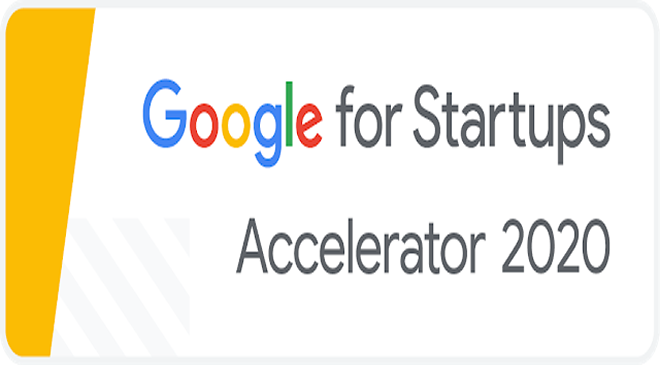First Virtual Google For Startups Class Graduates
 First virtual class of Google for Startups Accelerator Africa is graduating this week. The first all-online iteration of Google’s accelerator program for African startups has seen 20 startups from 7 countries go through a 12-week virtual journey to refine their offering and undergo mentoring and workshops in key areas such as technology, product development and business growth.
First virtual class of Google for Startups Accelerator Africa is graduating this week. The first all-online iteration of Google’s accelerator program for African startups has seen 20 startups from 7 countries go through a 12-week virtual journey to refine their offering and undergo mentoring and workshops in key areas such as technology, product development and business growth.
Onajte Emerhor, Head of Google for Startups Accelerator Africa said;
To date we have celebrated wins with one Nigerian startup playing their part in the fight against COVID-19 and three raising funding – one notable win being Franc raising a seed round of $250,000 after joining the program.
Class 5 of Google for Startups Accelerator Africa took part in three virtual bootcamps over the course of the program, covering technology, product, people and growth.
The Tech & Product bootcamp focused on assessing the startups’ value offerings and technology to ensure they were optimised to run efficiently with solid business models, not leaving any money on the table.
The Tech & People bootcamp took the founders – considered major pillars of startup success – through the Founders Lab, which evaluated their current managerial styles and advised them on how to become better leaders.
The final week sees the startups preparing to meet investors as they graduate.
Google for Startups Accelerator Africa gives early-stage startups access to the best of Google – its people, network, and advanced technologies.
The accelerator has trained participating startups on technology (AI/ML, Cloud, Android), product, data, business, design, people, growth and fundraising, through interactive workshops and labs facilitated by Google experts and mentors.
The selected pool of startups for Google for Startups Accelerator Africa 2020 are from Ethiopia, Ghana, Kenya, Nigeria, South Africa, Tunisia and Zimbabwe.
The startups cut across an array of industries including logistics, transportation, education, agriculture, e-commerce, media, health and professional services.
The 20 graduating startups are:
– Adi+Bolga (Ghana): Adi+Bolga uses technology to provide virtual skincare consultations and accurate personalised product recommendations to consumers.
– AmiTruck (Kenya): Amitruck is a digital platform that seeks to bring trust, transparency and efficiency to logistics by using technology to connect cargo owners and transporters.
– Beamm (South Africa): Beamm allows users to make Hollywood style CGI and VFX videos with ease.
– BuuPass (Kenya): BuuPass works with transport operators to provide digital solutions that seamlessly facilitate convenient and reliable movement of commuters.
– Crediation (Kenya): Crediation empowers tech startups to lend to their customers. It provides APIs and a dashboard to allow its partners to access funds for lending and process loans.
– Credpal (Nigeria): CredPal develops consumer credit infrastructure to ease consumer credit purchases, and enable retail businesses to provide on-demand credit for consumers in Africa.
– Crop2Cash (Nigeria): Crop2Cash is an offline accessible platform for farmers, making it possible for them to pay, get paid, and access agricultural credit via USSD while assuring financial institutions of their lending capital.
– Curacel (Nigeria): Curacel is a Claims and Fraud Detection Platform for African insurers.
– Festival Coins (Nigeria): Festival Coins is a suite of tools to help event organisers produce better events, with features including online ticketing, access control, cashless payments, and event reporting.
– Franc (South Africa): Franc.app is an investment app that helps first time investors realise their dreams by providing access to the best cash and equity funds without minimums or restrictions.
– Ilara Health (Kenya): Ilara Health brings essential diagnostic support and impactful software products to patients and providers across peri-urban sub-Saharan Africa, who currently are unable to access these basic life-saving tools.
– Judy (Nigeria): The smart, comprehensive database of African case law and legislation.
– Kaoun (Tunisia): Kaoun enables unbanked and underbanked individuals and businesses to access financial services through identification, payment and credit solutions.
– Send (Nigeria): Digital freight forwarder and customs broker for Africa.
– Stears (Nigeria): Stears is a trusted provider of high-quality African information that improves decision-making.
– The Smarthub (Nigeria): A platform to build and develop smart ideas for social impact, scalability and investment.
– Thumeza (Zimbabwe): A next-generation logistics platform utilising data in order to optimise the logistics function for enterprises.
– Uzapoint (Kenya): UzaPoint is an enterprise resource planning tool that enhances the efficiency, profitability and business intelligence of small scale businesses in retail.
– Zayride (Ethiopia): Zayride provides reliable, timely, and safe cab services using technologically enabled dispatch systems and integrated mobile money systems for payment.
– Zuka Data Science (Kenya): A blended learning platform with engaging data science programs designed by experts to enable individuals and organisations at all levels become data fluent.
Since its launch in 2018, the Google for Startups Accelerator program has worked with 47 startups from 17 African countries: Algeria, Botswana, Cameroon, Côte D’Ivoire, Egypt, Ethiopia, Ghana, Kenya, Morocco, Nigeria, Rwanda, Senegal, South Africa, Tanzania, Tunisia, Uganda, and Zimbabwe.
They have contributed to economic prosperity and empowerment by collectively raising millions of dollars in investment, and creating hundreds of jobs.
Google continues to support developer communities across Sub-Saharan Africa, through Google Developer Groups, Developer Student Clubs and Women Techmakers, providing training and support for developers aligned with real-life job competency requirements.
Community groups engage in activities like Study Jams: study groups facilitated by developers, for developers. Today there are over 120 active developer communities across 25 countries in Sub-Saharan Africa.
